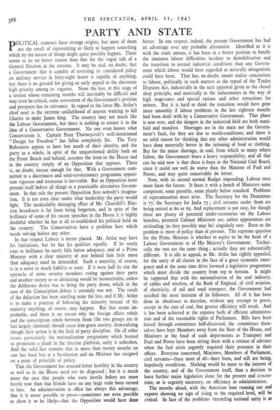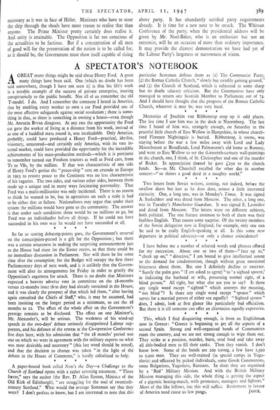PARTY AND STATE
pOLITICAL rumours have strange origins, but most of them are the result of representing as likely to happen something which by the nature of things might quite possibly happen. There seems to be no better reason than that for the vague talk of a General Election in the autumn. It may be said, no doubt; that a Government that is capable of reversing its considered policy on military service in forty-eight hours is capable of anything, but there is no ground for giving an early appeal to the electorate high priority among its vagaries. None the less, at this stage of a session whose remaining months will inevitably be difficult and may even be critical, some assessment of the Government's position and prospects has its relevance. In regard to the latter Mr. Attlee's chief asset is the extreme unlikelihood of anyone wanting to kill Charles to make James king. The country may not much like the Labour Government, but there is nothing to attract it in the idea of a Conservative Government. No one even knows what Conservatism is. Captain Peter Thomeycroft's well-intentioned "Design for Freedom" has fallen completely flat. The Tory Reformers appear to have lost much of their identity, and the party as a whole, in spite of the unquestioned ability both on the Front Bench and behind, assumes the form in the House and in the country simply of an Opposition that opposes. There is, no doubt, excuse enough for that. With a Government com- mitted to a doctrinaire and semi-revolutionary programme opposi- tion vigorous and strenuous is inevitable. But an Opposition muSt present itself before all things as a practicable alternative Govern- ment. In that role the present Opposition fires nobody's imagina- tion. It is not even clear under what leadership the party would fight. The incalculably damaging effect of Mr. Churchill's Elec- tion broadcasts is far from being forgotten, and in spite of the brilliance of some of his recent speeches in the House it is highly doubtful whether he has at all re-established his political hold on the country. The Conservatives have a problem here which needs solving before any other.
In that respect Labour is better placed. Mr. Attlee may have his limitations, but he has his qualities equally. If he rarely rises to brilliance he rarely falls below adequacy, and of a Prime Minister with a clear majority of 200 behind him little more than adequacy need be demanded. Such a majority, of course, is in a sense as much liability as asset. If it were half its size the spectacle of some seventy members voting against their party and another twenty or so abstaining would be inconceivable, unless the deliberate desire was to bring the party down, which in the case of the Conscription debate it certainly was not. The result of the defection has been startling none the less, and if Mr. Attlee is to make a practice of following his minority instead of his majority anything, of course, may happen. But that seems im- probable, and there is no reason why the foreign affairs rebels and the conscription rebels between them (the two groups are in fact largely identical) should cause him grave anxiety, demoralising though their action is in the field of party discipline. On all other issues, particularly the nationalisation programme which formed so prominent a plank in the election platform, unity is unbroken. And the solid fact remains that in more than twenty months no seat has been lost at a by-election and no Minister has resigned on a point of principle or policy.
That the Government has aroused bitter hostility in the country as well as in the House need not be disguised ; but it is much more the case that people who were hostile before are more hostile now than that friends have on any large scale been turned to foes. An administration in office has always this advantage, that it is never possible to prove—sometimes not even possible to show it to be likely—that the Opposition would have done better. In one respect, indeed, the present Government has had an advantage over any probable alternative. Identified as it is with the trade unions, it has been in a better position to handle the immense labour difficulties incident to demobilisation and the transition to normal industrial conditions than any Govern- ment which labour would have regarded as naturally antagonistic could have been. That has, no doubt, meant undue concessions to labour, politically in such matters as the repeal of the Trades Disputes Aet, industrially in the tacit approval given to the closed shop principle, and materially in the inducements in the way of high wage-rates and special rations and other attractions for miners. But it is hard to think the transition would have gone more smoothly if labour problems in the last eighteen months had been dealt with by a Conservative Government. That phase is now over, and the dangers in the industrial field are both mani- fold and manifest. Shortages are in the main not the Govern- ment's fault, for they are due to world-conditions, and there is no solid reason for thinking that any other administration would have done materially better in the rationing of food or clothing. But for the major shortage, in coal, from which so many others follow, the Government bears a heavy responsibility, and all that can be said now is that there is hope in the National Coal Board, since it could not well do worse than the Minister of Fuel and Power, and may quite conceivably do better.
Now, with its second normal Budget impending, Labour once more faces the future. It faces it with a bench of Ministers some competent, some passable, some plainly below standard. Problems of superannuation must arise. The Secretary for the Dominions is 77; the Secretary for India 75; civil servants under them are being retired at 6o or 65. And replacement is not easy, for though there are plenty of potential under-secretaries 'on the Labour benches, potential Cabinet Ministers are, unless appearances are misleading (as they possibly may be) singularly rare. Even so the problem is more of policy than of persons. The supreme question for the Prime Minister is whether to aspire to be the head of a Labour Government or of His Majesty's Government. Techni- cally the two are the same thing ; actually they are substantially different. It is idle to appeal, as Mr. Attlee has rightly appealed, for the unity of all classes in the face of a great economic emer- gency and at the same time drive forward a legislative programme which must divide the country from top to bottom. It might be supposed that with the nationalisation of the coal industry, of cables and wireless, of the Bank of England, of civil aviation, of electricity, of rail and road transport, the Government had satisfied the most insistent of its followers. All of it has been done in Obedience to doctrine, without any attempt to prove, except in the case of coal, that greater efficien' cy will result. And it_ has been achieved at the expense both of efficient administra- tion and of the reasonable rights of Parliament. Bills have been forced through committees half-discussed, the committees them- selves have kept Members away from the floor of the House, and Ministers at the head of such departments as Transport and Fuel. and Power have been sitting there with a retinue of advisers when the fuel crisis urgently required their presence in their offices. Everyone concerned, Ministers, Members of Parliament, civil servants—these most of all—have been, and still are being, hopelessly overdriven. Nothing would be more to the interest of the country, and of the Government itself, than a decision to leave further major legislation alone for the present and concen- trate, as is urgently necessary, on efficiency in administration.
The months ahead, with the American loan running out and exports showing no sign of rising to the required level, will be critical. In face of the problems impending national unity is as necessary as it was in face of Hitler. Ministers who have to steer the ship through the shoals have more reason to realise that than anyone. The Prime Minister pretty certainly does realise it. And unity is attainable. The Opposition is far too conscious of the actualities to be factious. But if a concentration of all men of good will for the preservation of the nation is to be called for, as it should be, the Government must show itself capable of rising above party. It has abundantly satisfied party requirements already. It is time for a new note to be struck. The NIVhitsun Conference of the party, when the presidential address will be given by MT. Noel-Baker, who is an enthusiast but not an extremist, will be an occasion of more than ordinary importance. It may provide the clearest demonstration we have had yet of the Labour Party's largeness or narrowness of vision.



































 Previous page
Previous page